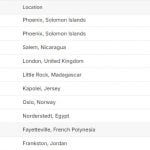Xtento Product Feed Export Module for Magento 2 and 1
Below, we shed light on another stunning Magento extension by Xtento. This time the tool is responsible for creating various product feeds for more than 50 third-party platforms and services. Furthermore, if your particular service is not listed below, you can contact Xtento and ask the company to provide you with the desired integration. Usually, this happens for free. For further details, check the following post dedicated to one of the most reliable Magento export managers that implements a highly flexible output creation technique for both Magento 2 and 1.

As you might have guessed, the Xtento Product Feed Export Module lets you export products in any file/feed format connecting your ecommerce website to various ERPs, stock systems, marketplaces, price comparison sites, shopping engines, etc. You can create an unlimited number of export profiles and integrate your online storefront with an unlimited number of export destinations, so generating a product feed will not only become as easy as possible, but satisfy literally all ecommerce requirements. Just have a look at these reviews to make sure that the module is worth your attention:
Three core features, you will get after installing the Xtento Product Feed Export Magento extension are: exporting all products into a specific directory; exporting one file for each modified product to an FTP server; sending emails with products weekly to a supplier. More features are listed below, and now we’d like to tell a few words about XSL Template, which is a part of the module utilized for creating different output formats: TXT, XML, CSV, Fixed-Length, etc. Note that each software, you are going to connect your Magento website to, has its own requirements related to the output format, and XSL translates the internal Magento format into the required one. Therefore, your Magento webserver should support the XSL PHP extension.
As for the aforementioned 50+ connectors, they are:
Backend
The extension is available under Products -> Product Export, but you can export products right from the grid at Products > Catalog from the Actions dropdown.
In Manual Export, you choose an export profile, set starting and ending IDs, and apply additional filters, such as Date Range from/to or Created during the last X days. Besides, you can activate two more options: Export only not yet exported objects and Serve file to browser after exporting.
All export profiles are gathered in a grid that consists of 9 columns:
- Checkbox (select profiles to apply mass actions);
- Profile ID (contains a From/To filter);
- Export Type (categories or products);
- Name (enter a product or category name to find what you are looking for);
- Profile status (enabled or disabled);
- Configuration (Cronjob Export and Event Export);
- Last Export (contains a From/To filter);
- Last Modification (contains a From/To filter);
- Action (edit profile here).
Note that you can delete profiles in bulk as well as change their statuses. Besides, all columns except Checkbox and Action supports sorting.
While creating a new profile, you should specify its name and choose export type (products or categories).
Next, you have to deal with 8 tabs of settings: General Configuration, Export Destinations, Output Format, Stores and Filters, Manual Export, Automatic Export, Profile Execution Log, and Profile Export History.
General Configuration is divided into two sections. The first one contains such data as profile name, status, and export type. The last setting can not be changed.
The second section is called Export Settings. It contains such options as Save local copies of exports, Export each product separately, Export empty files, Remove HTML in exported data, Replace new lines in attribute values, and Remove store parameter from URL.
All destinations are available in the following grid, where you can edit each one:
While editing a destination, you have to deal with 2 sections of settings: Destination Settings and configuration of the chosen destination type. In the first section, you can edit name and type of the destination. Besides, there are such data as status (used in X profiles) and the last result message.
And this is how the Output Format tab is designed:
The Stores & Filters tab is divided into 5 sections: Store View & Customer Group; Product Filters; Advanced Product Filters; Additional filters; and Performance Settings.
In Store View & Customer Group, you choose both parameters.
Product Filters include Date From; Date To; Created during the last X days; Updated during the last X minutes; Export only new products.
As for Advanced Product Filters, they are: Export *only* in stock products; Product visibilities to export; Product status to export; and Hidden Product Types.
The is how additional filters look like:
Performance Settings can be used to speed up the export.
In Manual Export Settings, you can enable/disable the feature as well as choose whether to save files on destinations for manual exports or not and serve files to browser after exporting manually or not.
As for the Automatic Export tab, it is divided between two sections: Cronjob Export and Eventbased Export. In the first one, you can view cronjob status, enable it, choose export frequency, or set a custom one.
In Event-based Export, you choose events that automatically starts product export.
This is Profile Execution Log. All exports are logged here, and you can download each file.
As for Profile Export History, all exported objects are logged here.
All export destinations are available on the Destinations page in a grid.
The Tools section of Xtento Product Feed Export Module for Magento 2 and 1 lets you upload previously exported settings as well as import them.
Main Features
- Seamless Magento integration;
- Fast way to create and export product/category data feeds;
- 53 connectors for popular marketplaces;
- Supports almost any output format;
- Supports all product types;
- Flexible filtering system;
- Unlimited amount of export profiles;
- Unlimited amount of export destinations;
- Export from Catalog > Product grid;
- Automated export after a product/category has been modified/created or at predefined time intervals.
Final Words
Being one of the most flexible product export Magento solutions, Xtento Product Feed Export Module for Magento 2 and 1 essentially enhances the default export capabilities of the platform. At the same time, the extension has a quite reasonable price tag – just $129, which is a small investment that will be rapidly returned.
Keep in mind that FireBear offers a free Product Feed Export add-on for Magento 2 that allows you to transfer your product feeds to such famous marketplaces as Google Shopping, Yandex Market, eBay, Facebook Page Shops, Amazon (Inventory, Marketplace, Ads), etc.
Get/Buy Free Product Feed Export add-on for Magento 2









